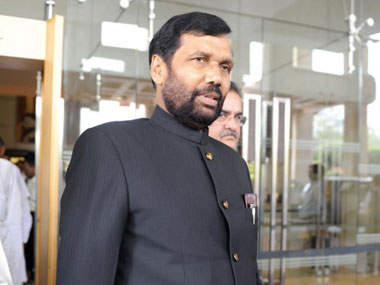The Centre is planning to amend the Essential Commodities Act to make the six-decade-old law simpler by replacing jail term with hefty fines and penalties depending upon the nature of the offences. In this regard, the Centre has sought suggestions from the states. Union Food and Consumer Affairs Minister Ram Vilas Paswan on Tuesday said that the Essential Commodities Act would be made simpler by diluting certain stringent provisions that currently provide for jail term even for a minor offence.
Paswan suggested that the sates may look at simplification of the Essential Commodities Act, including penalty provisions that would make it more attuned to the government’s policy regarding ease of doing business and promote investment, an official statement said.
Certain provisions required changes because almost all the offences attract a jail term from minimum three months to maximum seven years, said a report in The Times of India quoting an official in the consumer affairs ministry. “Most of these are draconian provisions and need to be changed. After getting feedback from states, we will submit it to the NITI Aayog committee under Maharashtra chief minister Devendra Fadnavis,” an official was quoted as saying in the report. Paswan also asked states to lift pulses and onions from the Central buffer stock and sell these commodities in retail markets to keep prices under control.
Union Minister @irvpaswan exhorts States to buy Pulses and Onions from Central buffer for retailing in States/UTs to ease pressure on prices; Stresses on the creation of Price Stabilization Fund in each States
— PIB India (@PIB_India) September 3, 2019
Details home: https://t.co/wlgZt9Vh45 pic.twitter.com/shHt7hyCVY
He also announced that inter-state ration card portability is expected to begin from January 2020 in 14 states and expressed confidence that target of ‘One Nation One Ration Card’ would be achieved by June next year as envisaged, reported PTI. The minister was speaking to media after holding the fifth national consultation meeting of ministers of States/UTs to deliberate on various issues. [caption id=“attachment_2670126” align=“alignleft” width=“380”] File image of Ram Vilas Paswan. PTI[/caption] On onion and pulses, the minister said: “We have sufficient buffer stock of pulses and onions. We have asked all states/UTs to place their demand and lift pulses and onions from buffer stock”. The minister informed that the Centre has a buffer stock of 27 lakh tonnes of pulses and 56,000 tonnes of onions which states can lift for direct retailing through ration shops, co-operatives, state agencies and marketing federation. Elaborating on the meeting, Consumer Affairs secretary A K Srivastava said states have been also advised to create ‘price stabilisation fund’, similar on the lines of one established by the Central government. He said four states already have such fund. On the Essential Commodities Act, the secretary said: “There are penal provisions in the law which are stringent and outdated. We have asked suggestions from states how to simplify it”. “For every violation, there is a provision for jail,” he said, adding that the punishment is not commensurate with the offence. The proposed amendment in the Essential Commodities Act is being done in consultation with the NITI Aayog with an aim to boost investment and ease of doing business without compromising on consumer protection, he added. Last month, the high powered committee of chief ministers on the transformation of Indian agriculture had suggested amendments to the Essential Commodities Act saying the regulation should be enforced only in “extreme” cases. The Essential Commodities Act was established to ensure the delivery of certain commodities or products, the supply of which, if obstructed owing to hoarding or black-marketing, would affect the normal life of people. This includes foodstuffs, drugs, fuels (petroleum products). Meanwhile, Paswan expressed concern over single-use plastic and said that a meeting has been called on September 9 to find an alternative. Industry representatives, including those manufacture packaged drinking water, would be invited. The Bureau of Indian Standard (BIS) would also be asked to suggest some alternative, the minister said. Two separate meetings have also been convened to assess how BIS makes standards, their implementation and also functioning of labs. Paswan said the Prime Minister in his Independence Day speech called for a reduction in usage of plastic, so the ministry would look into this issue. Food Secretary Ravi Kant informed that issues like end-to-end computerisation of PDS, ration card portability and rice fortification programme were discussed. — With PTI inputs


)

)
)
)
)
)
)
)
)



